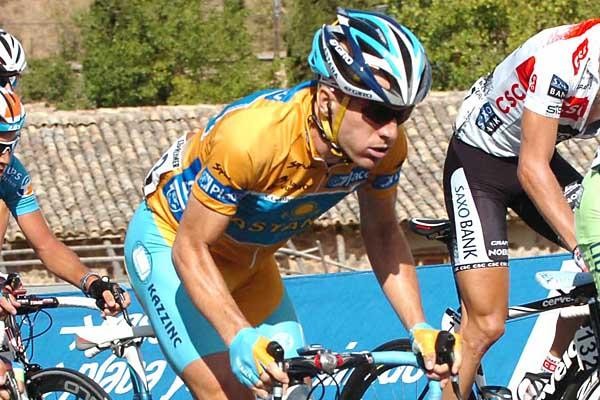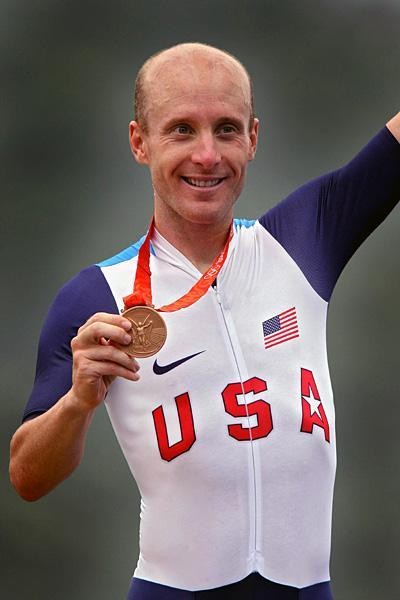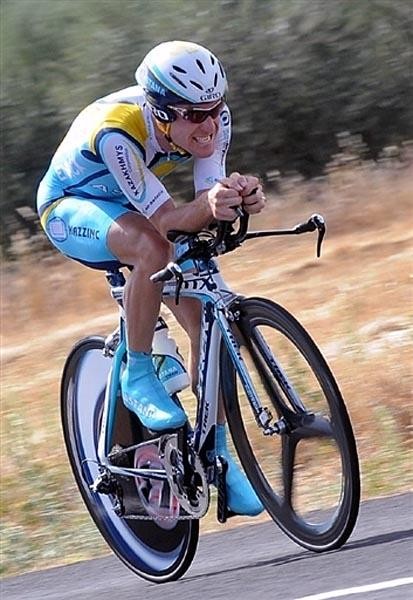GC favorite or right hand man?
Levi Leipheimer is once again leading the Vuelta a España, returning to the maillot oro after two...



An interview with Levi Leipheimr, September 8, 2008
GC favorite or right hand man?
Levi Leipheimer is once again leading the Vuelta a España, returning to the maillot oro after two days in the high mountains. However the Astana rider is on the same team as Tour de France and Giro d'Italia winner Alberto Contador, a Spaniard is considered the number one rider on the squad. Cyclingnews' Shane Stokes looks at Leipheimer's strong season and the team's likely intentions for the three week Tour.
Levi Leipheimer has had an excellent start to the Vuelta a España, winning the stage five time trial, wearing the maillot oro for a stage and then returning to the race lead after two days in the mountains. He will start the ninth stage from Viella to Sabiñánigo 21 seconds clear of Astana team-mate Alberto Contador, and 49 seconds ahead of Alejandro Valverde (Caisse d'Epargne). Tour de France victor Carlos Sastre (Team CSC - Saxo Bank) is one minute 27 seconds back in fourth place.
Leipheimer finished third in the event seven years ago, stunning many with such a Grand Tour debut and showing that he was a bona fide contender for three-week races. Now, years later, he's back racing in Spain and shining in gold.
He first took the lead when winning the time trial, but the maillot oro passed to Sylvain Chavanel (Cofidis) and then to Alessandro Ballan (Lampre). The American took it back with a strong performance on Sunday's eighth stage to Pla de Beret, and spoke about the previous wearers of the tunic.
"I think that Chavanel and Ballan both earned it," he said, playing down any talk of the team 'gifting' the jersey to them. "We didn't contest Chavanel, but realistically I can't beat him in the sprint. He would get the jersey, no matter what, but to make it easy we collaborated a little bit with him. It was good for us to save the team. On the other hand, Ballan was really very strong yesterday. They earned it."
Get The Leadout Newsletter
The latest race content, interviews, features, reviews and expert buying guides, direct to your inbox!
The fact is, had Leipheimer followed his usual programme, it'd be highly unlikely that he'd be riding the Vuelta. He's targeted the Tour de France ever since that good Tour of Spain in 2001, finishing eighth, ninth, sixth, twelfth and third between 2002 and 2007.
Following that podium finish last July, the plan was to bank everything on this year's race, aiming to go even higher in the results. However the entire Astana team was refused entry by ASO and missed out on riding the race. As a result, the Vuelta – rather than the Tour - is his and the team's Grand Tour target for the second half of the season.
Leipheimer was consequently delighted to take the time trial stage plus the overall lead on Wednesday. "I've been feeling very strong for the last couple of weeks, since the Olympics [he was third in the time trial in Beijing]," he told journalists after the race against the clock.
"This is another big highlight for me and this team. It's always an honour to win a stage in a Grand Tour, plus wear the leader's jersey."
He was equally happy to get back the gold jersey on Sunday's mountain stage, and is clearly one of the very strongest riders in the race.
Impressive form in 2008
Leipheimer has taken many important results this season, including first in the time trial and overall classification in the Tour of California, third in the Tour de Georgia, third plus a stage win in the Dauphiné Libéré, first in the Cascade classic and third in the Olympic time trial in Beijing.
Then, after coming back from China, he won the pre-Vuelta Clásica a los Puertos de Guadarrama, gaining an important psychological boost before the Spanish Tour. Whatever the outcome of the rest of the Vuelta, it's likely that his stage win and overall leader's jersey in the race will be one of the standout points of the season.
Two others will rank highly on his list, going by what he told Cyclingnews before the Tour of Spain started. "In terms of highlights…the Tour of California is always important for me, and then winning the Olympic medal was big," he stated. "Those two were definitely on top. They were two of my goals for the year, even before we heard the news about the Tour [ASO's refusal to grant a place to Astana]. Those moments are the ones that stand out for me."
Narrowing it down further, the Olympics was clearly a big, big moment in his career. "Obviously I dreamt about winning the time trial, but I have to say that I am really happy about getting a bronze," he said. "I think just getting an Olympic medal is something else - after the fact, it [the experience] is more than I had ever imagined it would be, really. It was a great experience to be able to stand on the podium, see the flags being raised, and then the next day to do the US media tour that most of the medallists get to do.
"I had a really great time in Beijing, especially with the US team, with George (Hincapie), Christian (Vande Velde), Dave (Zabriske) and Jason (McCartney). We all had a great time, we had a lot of fun. I think the Olympic spirit is pretty contagious."
The Olympics was originally contested by amateur riders until 1996, and then it changed over to being a professional event. It took an edition or two for the prestige to rise – clearly it had less of a history for the pros - but it's now seen as one of the biggest races a rider can target. Leipheimer is certainly clear as to its significance.
"It is only every four years, and the Olympics has grown so much as an event over the last 20 years or so," he said. "It is huge now - if you look at the Chinese they spent billions and billions on the Olympics. Then you see the preparation that the riders are putting into it, like Cancellara - he was obviously very focused on it. And then the winner in the road race, Sanchez, you should see how emotional he was.
"I think it shows that everyone is taking it extremely seriously. I would say probably even more so than the world championships, because it [the Olympics] is every four years and it is not so late in the season as well."
The sheer scale of the event impressed him greatly, and added to the satisfaction he took from his medal there. Unlike the Worlds, the Olympics features many, many other sports and this greatly ramps up the numbers of those competing and also being involved with the general running of the event.
"Apart from winning a medal I think that the thing that impressed me the most was the amount of people working on the Olympics," he enthused. "The volunteers, the people in the village landscaping, standing guard, doing maintenance in the athletes towers, or even in the cafeteria - it was just huge. It was really impressive."
Missing Tour, targeting Vuelta
The Astana team may have been absent from the Tour de France, but there is one silver lining to that cloud; the riders are fresher than most, and could well benefit from those reserves in Spain. They are also highly motivated; if Contador does pull off the win, he will make history as one of only five riders [along with Jacques Anquetil, Felice Gimondi, Eddy Merckx and Bernard Hinault] to win all three Grand Tours. That has to be an inspiration for any team.
What's more, if the Spaniard does it this year he would actually surpass the achievements of the other four riders. The fourteen months between his Tour 2007 victory and the end of the Vuelta would beat the Tour/Vuelta (1978) and Giro (1980) triple timeframe set by Hinault.
Leipheimer is, of course, also a candidate for final victory. He's put in a lot of training and while he says that Contador is the team number one, he'll be ready to strike if that Plan A doesn't come to fruition.
"Missing the Tour was very difficult," he said, talking about his motivation at this late point in the season. "But it was in a good way, because it made me get out the door and train really hard. I felt like I was missing out. I trained well in July and it paid off in the Olympics."
The layout of his racing programme has also helped, in that he feels that his batteries are more highly charged now than in other years. "A Grand Tour definitely takes a lot out of you," he said. "Having done the Giro and the Dauphiné, which is a big load of racing, I was able to take a break. I took eight or 10 days really easy. A lot of time when you take a big break like that you lose fitness, but I immediately came back very fresh, but strong. I have felt that way since then."
Given that the Vuelta was his breakthrough race, heading back there seven years later motivates him a lot. It completes the circle, in ways, and there are also other parallels. "It brings back a lot of memories from 2001," he said, reminiscing. "At that moment I was on US Postal, which is a lot like the team I am with now. It is basically the same management, the same structure - it is Johan's team and there are even some of the same riders. Chechu [Jose Luis Rubiera] helped me in that race to get third place. So I remember a lot about it, and I am hoping to do as well [this time].
"But obviously we have Alberto, who is the big favourite. We are here to win the race, and if one of us is strong enough to do it, then the others will support him."
While there are two leaders, Leipheimer says straight out that Contador is the chief captain. "I would say that he definitely is the number one on the team," he stated before the Vuelta started. "He has won the Tour, he has won the Giro, and he has proved that he is the best rider in the world when it comes to stage races, especially Grand Tours. I don't think you could argue with that. He is definitely in the pole position."
Despite winning a stage and leading the race, he was echoing these sentiments after stage nine. "I am still riding for Alberto Contador," he said. "He has an acceleration uphill like nobody else. You can see that when he attacks. Maybe only a good Valverde can follow him then. We still have the mountains in Asturias to come and the time trial in Navacerrada. He won the Tour and the Giro and is the best climber in the world."
Parcours and post-race
Prior to the Vuelta start, Leipheimer had pinpointed certain stages as likely to be of bigger significance. He said that the first mountain stage to La Rabassa in Andorra was 'maybe the hardest stage of the whole Tour,' and that the following day's stage to Pla de Beret will also play a big part in the outcome. Both worked out well for him, clearly.
"In Asturias we have l'Angliru," he said, talking about the mythical climb which will make its fourth appearance in the race. "I have never done it, but I am kind of looking forward to that.
"Apparently the day after that to Invierno is not so difficult. But you never know. Not only the uphills but the downhills are very decisive in that area. We have to be on our toes."
The nervous nature of the Vuelta plus the exposed countryside also means that the flatter stages could potentially have a big effect on the race. US Postal and Discovery benefited from this in the past, throwing the hammer down at times and creating echelons.
"The Vuelta is very different to the Giro and the Tour," he explained. "I would say that the Tour splits in the wind maybe once every 10 years, but the Vuelta splits in the wind every year. In fact, I don't think the Giro ever splits that way. But the wind is definitely a big factor in the Vuelta. For us, I think it is good; we have a strong team, we have guys who can make the race in the wind."
The race headed into the big hills on Saturday and the general classification was upended once more. The number of overall contenders has fallen and Astana has show itself to have two very strong riders for the GC.
Leipheimer will enjoy his time in gold, but implies that it is his team-mate who he expects to be the better bet as the race goes on. "Alberto is the number one captain on the team," he said. "I just have to follow everyone right now as I am ahead in the classification, and I will try to save as much as I can for the future. Ultimately, though, Alberto will be the captain.
"The final climb yesterday and the final climb today were not so hard. They are not steep and that big time differences can't be made. And while I've never seen the Angliru, I am convinced that the mountains in Asturias are another story… It's a long way to go. Now we have the leader's jersey and everybody will look to us to control. There's a lot of work to do."